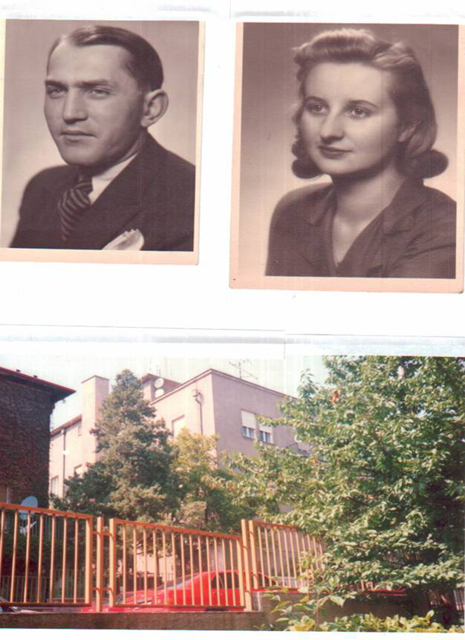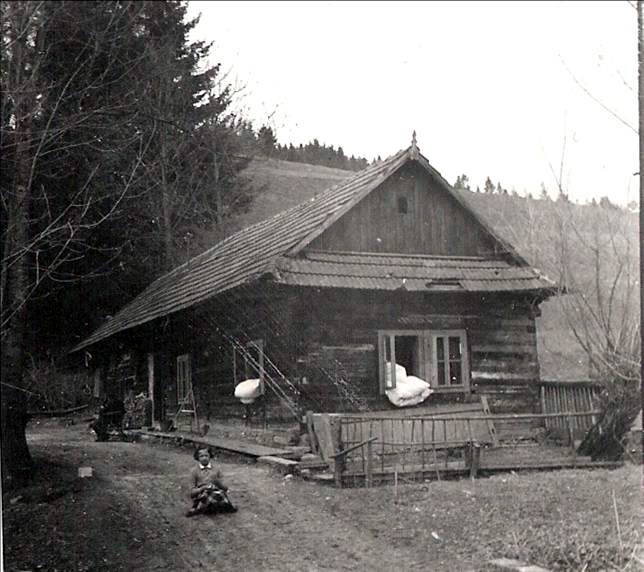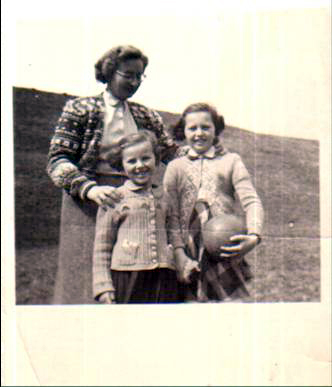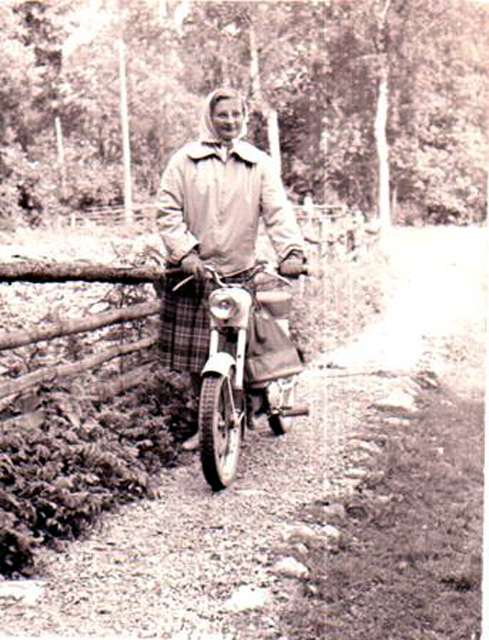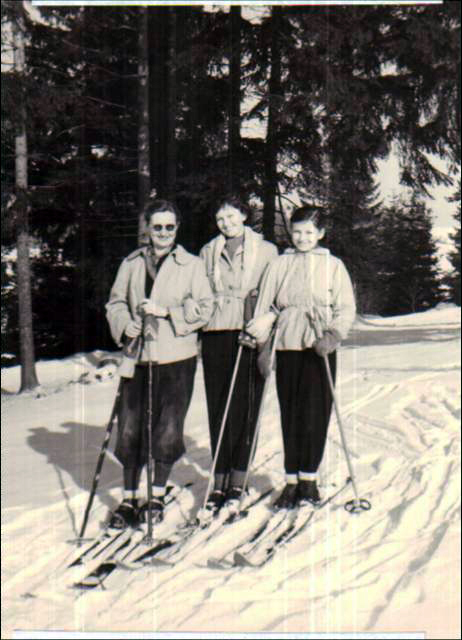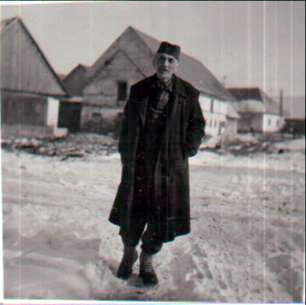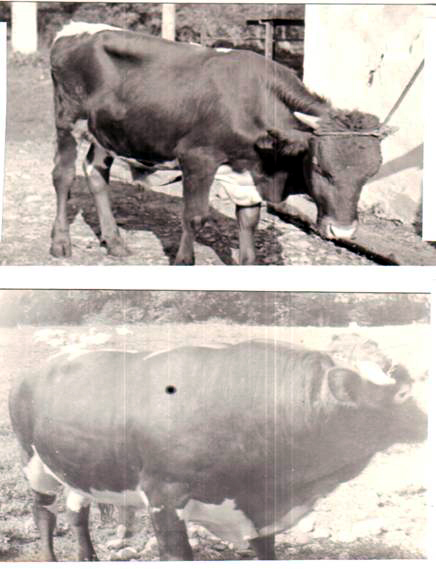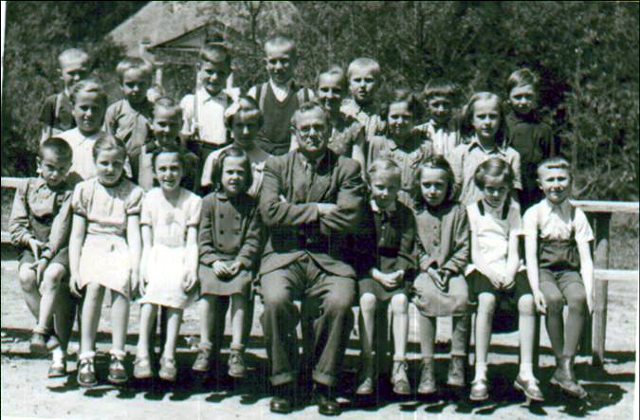Our Childhood Experience with Communism
Memories of the daughters of a political prisoner during the early communist era in Czechoslovakia
Communism as an institutionalized violence is one of the forms of the totalitarian system which is characterized by a very ingeniously built up network to supervise people's mind. Its main feature is an overall suppression of basic human rights that includes limitation of free communication (recorded telephone calls, informers at working places, obligatory memberships in some organization, etc), limited access to information, limited access to education, pushing aside non-conforming people (labelling them as second class citizens), selection of conform people very often with low moral.
Democratic elections in 1946
In the post-war Czechoslovakia the democratic election was organized in May 1946. /At that time nobody had any guess that it was the last free election for the following 42 years/.
Following registered political parties were on the scene in Slovakia:
61.43 % DEMOCRATC PARTY with its program based on Christian-democratic principles honoured before the war during 1st CR
30.48 % COMMUNIST PARTY supported from the Soviet Union
04.20 % PARTY OF FREEDOM
03.11 % LABOUR PARTY
However, the total sum of the votes in both Czech and Slovak parts of the country gave a final majority to the communist party. It happened for the first time in the European history that communists won in democratic elections.
At this point the stage story of our family started
Our father Ferdinand Jurčovič was born in Vistuk in Slovakia. He graduated from the National Economy at the Charles University in Prague in 1936. Then he returned back to Bratislava, had several positions in the field of administration of agriculture and nutrition. During the war he worked in the administration of miller's trade in Nitra. After the war he joined the group of young catholic democrats and actively worked for the Democratic Party, especially in the election campaign. At that time he was promoted into a position of a Director of the Slovak National Food Industry.
He was married to Maria Höcková a descendant of a Czech family, at that time a student of Faculty of Art at the Comenius University in Bratislava. They lived in the house of her parents in Bratislava and had two daughters.
1946-47: The still existing democratic state establishment
The normal life was going on without any remarkable danger, or threatening. After the Democratic Party won the election in Slovakia, communists strenghtened their activities to weaken the position of the Democratic Party, and to discredit the democrats. In June 1947 communists officially accused the Democratic Party from supporting anti-state elements, that was never proved. In addition, there was an extreme dry season, and bad harvest, problem with food supply. The political crisis was approaching. Moreover, highly positioned communists working the infrastructure of the party tried to attract some selected people to join them for the exchange of several benefits. All these and other activities led to the proclamation of the State Department of Internal Affairs on "revealing of the conspiracy against the state in Slovakia" in September 1947.
What were the consequences of this fabricated conspiracy? The state security arrested 707 persons. They were divided into 3 groups, according to their activities. The numerically smallest, but most "dangerous" group consisted of 17 people, all in the key positions of the political and professional spheres. Among them was Ferdinand Jurčovič.
On October 9, 1947 Ferdinand Jurčovič did not come home from his office after the regular working hours. He got arrested by the state security, and was transported to its place, where he was held for examination. At home nobody new what happened. They learned it several days later. In the state security arrest people were cross-examined and made to accuse themselves from things they have never committed under the permanent psychological and physical pressure. That lasted seven months. The official constructed trial was scheduled on May 15, l948, already after the communist coup. Ferdinand Jurčovič was sentenced to 7 years in prison without any right to appeal. The verdict was: "conspiracy against the republic and high treason". My mother was just before finishing her study, and she was expelled from the University within a program so called "democratization of education". Because she had at that time two young children, the family was totally dependent on the support of her parents.
1948-52: The early communist era building up an ideal system
My mother found job as a technician in one chemical laboratory. We, an incomplete family, lived in the house of our grand parents who took care of my sister and me. Over 30 prisons and the concentration camps for political prisoners were in Czechoslovakia. Our father was in some of them: Ilava, Nový Jičín, Plzeň, Leopoldov and also Jáchymov uranium mines where was hard labour and intellectuals and priests. The most detrimental living conditions were in Jáchymov - famous uranium mine. They were digging the uranium ore in several 100 m dept with the use of very primitive tools - just a stick. Then the uranium-rich pieces of the ore were sorted out from the ballast. It had been done by hands without any protection from the irradiation in the place called the Death Tower.
Twice a year they were allowed to receive visit. At Christmas time and ones more for brave behaviour. At Christmas it was allowed to bring one photograph and a parcel of limited weight: we packed calories rich food such as bacon, sausage, chocolate, cakes, sugar, and also some cigarettes. Sometimes books were permitted but they had to pass the censure. In irregular time intervals it was allowed to exchange letters. The letters were checked by a censor, and some words, or even sentences were painted over with black pen. They were stamped „censored" and delivered. The parcel was opened and checked immediately in the presence of the visitors to be sure that it did not contain any dangerous instrument. The visit lasted 15 minutes, and in the presence of a warder. On a special request, children were allowed to come, too.
Once, I remember we were walking through a corridor outside, and on the left and right there were standing prisoners. All had grey uniforms caps, and their faces were also grey. Each had the white cross on the back. It was a target for the shooter in the case of an attempt to escape from the prison. We were asked to go to a hall, were we met our father in the presence of the warder. We met, but there was a counter and a high barrier between us: lower part of the barrier was a perforated metal plate, and upper part was a dim glass. So we either were able to hear or to see each other. We gave over the parcel, which was immediately open by the warder, he took out a walnut cake, broke it to small pieces, threw it on a piece of newspaper and handed to my father.
1952: Building up an ideal society cleared of enemies of the state
One of the programs of the governing the Communist Party was to disintegrate /ruin/ the infra-structure of the non-conform middle class, labelled as "the enemies of the state". This program was known under the official title ACTION-B. In reality people were forced to leave their homes for some clearly defined inhospitable difficult to live districts, in a very short time period. In this way many nice well-maintained houses and flats were free for moving in the new coming communist "notables". We were delivered a decree to leave our house in Bratislava within 5 days at the end of October 1952. Because it was a general phenomenon in the city, an atmosphere of fear, and at the same time solidarity arouse. Neighbours came over to help with packing. The responsibility was on our grand father, because our father was in prison. We were assigned one wagon in the railway station were we had to load just necessary things to survive, and we moved to a remote small village called Jasenová, in the northern part of Slovakia.
1952-64: Our life in the new home
This was our new home for the following 12 years. This little romantic cottage was completely abandoned, without water, electricity, oven, or toilettes, but with holes in the roof. There was a kitchen and one room for 5 of us. After the people had found out who we were, and why we appeared there, they showed a great deal of loyalty, helped us to survive the first strong winter.
There was an elementary school in Jasenova, so called one-room school. Five classes (6 - 11 years) were having lessons in one room with the same teacher. Our mother was teaching languages in evening classes in the neighbouring local town, 6 km distant from Jasenova. Since the public transportation was limited, she used first bicycle, then small motorcycle to be able to manage everything.
October 1953
Our father came back from prison. The reunion of the family was very happy, but a difficult time period was still ahead of us. He was 42 years old and was in very poor health condition. Because of the long-time exposure to gamma-irradiation, and also malnutrition his bone marrow function was impaired. He had 1.5 million red blood cells instead of 5.5 million which is normal for men. He suffered from severe anaemia, plus sleep disturbances, and general weakness. He lost 20 kg of his weight. Under these health conditions he got permission for physical work only. He worked as worker in building industry. His health did not improve it got even worse, while working as a brick-layer, so he had to be hospitalized for several months. After coming home he was allowed to work in the same building enterprise as a cashier.1955- F.J. got a very fine job in a Research Institute for Forestry in the Department for documentation of foreign scientific literature.
1954-58: The well established communist system protects the ideal society from any foreign influences
On the horizon normal life was arising for us. We went to school in the local town, my mother was still teaching in evening classes, and her good reputation rose day by day. Still she was not allowed to teach in school because of her suspicious social background. And I have to emphasize that in spite of some consolidation of our life-conditions, we were constantly monitored by state secret security (StB).
The anticommunist uprising in Hungary started in November 1956. Our authorities in a fear of a possible loss of the control over the situation in the country started to exert more pressure and terror upon people. In all institutions screenings (cleansing processes) of individuals took part again. Ferdinand Jurčovič lost his job as an unreliable element. One year later my sister was finishing junior grammar school at the age of 14 years (obligatory education) with distinction, and naturally, she wanted to continue in her education in a local secondary school. But, as a daughter of the "enemy of the state", she got the permission to attend the professional school only. And the profession she was sent to was a brick-layer apprentice. With the help of a good courageous friend who put under risk his own existence she was admitted to a secondary school.
1958-64: The well established communist system, tries to pretend human face
After our father was fired from the Research Institute, and sent to do a manual profession again, he found a job in as a care-taker of young beefs which were grown to give meet in a local co-operative farm. They were fed for 6 months and sent to a slaughter house. Their weight gains were evaluated regularly. Based on his results he was awarded with a first prize as a best beef-keeper in the district.
1964: Coming back to Bratislava
The whole family gradually came back to Bratislava, each member under different circumstances. Of course not to our house, but we were allowed to bye a cooperative flat. Our father never completely recovered from the prison, as he ones said:
"Prison was only a partial prison, because I had dreams about freedom. And freedom is only a partial freedom, because I have dreams about prison".

